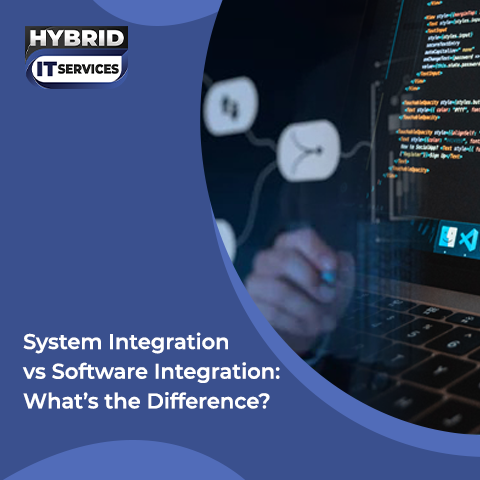Low-code application platforms (LCAPs) are transforming the way companies develop websites. These platforms enable people to create applications using graphical interfaces. With little hand-coding, accelerating the development process tremendously. With growing pressure on companies to provide faster digital solutions, low-code offers a pragmatic alternative.
It is different from conventional coding without compromising functionality or personalization. Hybrid IT Services enable companies to use this Low code software development while keeping costs in check.
How Low-Code is Different from Conventional Web Development
A traditional web development lifecycle typically entails coding thousands of lines of code. Dealing with intricate integrations and enduring lengthy development cycles. Every stage from requirement gathering to deployment calls for expert skills and extensive time investment.
Low-code development platforms, on the other hand, employ visual tools. Drag-and-drop elements and reusable modules to simplify and accelerate every stage. This enables both experienced developers and non-technical team members to be involved in application development, making collaboration easier and delivery faster. Let’s see some benefits of low-code platforms:
Read here: How to Choose the Right App Development Framework?
Accelerated Development Cycles
One of the strongest benefits of low-code web development is speed. What once took weeks or months in conventional development can now be achieved in days. With pre-built templates, visual design editors, and automated deployment pipelines, development teams can quickly go from concept to launch.
At IT Company, we’ve seen businesses reduce their time-to-market by up to 70%. It is only possible by using low-code development platforms. It gives a competitive edge in responding to customer needs and market opportunities.
Cost-Effective Web Development
Low-code platforms cut the dependency on big development teams and long coding hours. Directly impacting project costs to be lower. Web development companies also save costs on infrastructure and maintenance. As the majority of LCAPs come with built-in hosting, updates, and security features. This makes low-code a perfect fit for startups, SMEs, and enterprises that wish to minimize costs while ensuring quality.
Hybrid IT Services enables clients to get the most out of ROI by leveraging low-code technology to create lean, scalable solutions.
Facilitating Business-IT Collaboration
One of the most impressive advantages of low-code workflow automation is the way it closes the gap. It closes the gap between IT teams and business users. Non-technical stakeholders can engage directly in the development process. Constructing forms, defining logic, and testing workflows without coding. This synergy guarantees that the end application closely reflects business objectives.
Improved Agility and Flexibility
In rapidly changing business landscapes, agility is the key. Low-code platforms help organizations quickly evolve based on customer feedback or fluctuating requirements. Introducing new features or workflows becomes much easier than in standard systems. Hybrid IT Services employs agile development methods in low-code projects, and our clients remain flexible and adaptive even after they are deployed.
Lets explore: How to Optimize Performance In Custom Software Development ?
Smooth Integration with Current Systems
Today's businesses are based on a blend of applications CRM, ERP, payment systems, and so on. Low-code platforms ease integration with native connectors. API connectivity and cloud-native design. That allows companies to create apps that integrate seamlessly with their current tech stacks. Hybrid IT Services makes all integrations secure, scalable, and designed for your operations.
Scalability and Long-Term Growth
There's a widespread fallacy that low-code is used only for little projects. On the contrary, these days, platforms are capable of running enterprise-grade apps. They have scalable infrastructure, solid database support, and performance optimization tools that scale up as your company does.
Addressing Customization and Constraints
While low-code platforms have a wide range of pre-built elements. Advanced customization is needed for some projects. The best part is that most top platforms support custom coding when necessary. Hybrid IT Services assist clients through these situations by combining traditional development methods. Where appropriate giving you low-code flexibility without sacrificing the ability to customize.
Reducing Security Threats
Security is a paramount concern for any digital product. Low-code solutions have inherent capabilities such as role-based access controls, SSL encryption, and audit trails. Nonetheless, companies still must adhere to best practices in order to remain compliant with industry standards.
Click here to read: Why Custom Software Development is Expensive?
Best Use Cases for Low-Code Development
Low-code isn't a size-fits-all solution, yet it shines with specific use cases:
Internal Tools & Dashboards: Develop admin dashboards, forms, and HR tools in record time.
Customer Portals: Craft user-friendly, secure web portals with ease.
Automation of Workflows: Automate repetitive tasks such as approvals, notifications, and reporting.
MVP Development: Test product concepts quickly using a functional prototype.
The Future of Web Development is Low-Code
Low-code application platforms are transforming how businesses approach digital innovation. They empower teams to build applications faster, cut development costs, and adapt quickly to change. Whether you’re a startup building your first MVP or an enterprise modernizing legacy systems, low-code can be the key to unlocking speed, agility, and efficiency in your web development lifecycle.
Hybrid IT Services is your go-to partner in this evolution. With our extensive experience in low-code technologies and agile deployment, we guarantee that your digital solutions are not only quick to market but also secure, scalable, and strategically aligned with your business.






